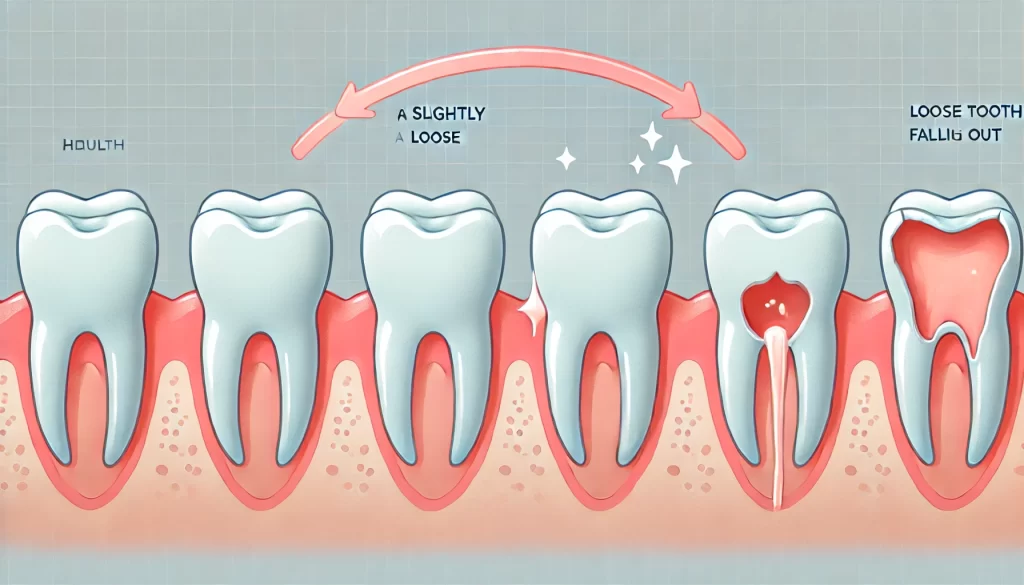Table of Contents
When you think of loose teeth, you might picture children excited about losing their baby teeth. However, adults can also experience loose teeth, and it can be quite alarming. But how long does a loose tooth take to fall out in adults? The answer varies depending on the cause and how well you take care of the problem. In this article, we’ll explore everything you need to know about loose teeth in adults, why they happen, how long they might take to fall out, and, most importantly, how you can address the issue to avoid further complications.
Why Do Adults Experience Loose Teeth?

How Long Does a Loose Tooth Take to Fall Out in Adults? In adults, loose teeth can result from various factors. Understanding these causes is crucial to addressing the root problem and potentially saving the tooth before it’s too late.
1. Gum Disease (Periodontitis)
One of the most common reasons for a loose tooth in adults is gum disease. When plaque builds up around the teeth, it can cause inflammation and infection in the gums, leading to gum recession and weakening of the bone that supports the teeth. Over time, this can cause the tooth to loosen. In time, the tooth may fall out if treatment is not received.
2. Injury or Trauma
Accidents or trauma to the mouth, such as a fall or a sports injury, can also cause a tooth to become loose. Even if the trauma occurred years ago, the effects might still show up later, weakening the tooth’s support structure.
3. Grinding Teeth (Bruxism)
Grinding your teeth, especially at night, can wear down the enamel and weaken the tissues supporting your teeth. This habit can eventually cause teeth to become loose. If you suspect this is the cause, wearing a mouthguard while sleeping might help prevent further damage.
4. Osteoporosis
Osteoporosis is a condition that weakens bones, and it can also affect the bones in your jaw that support your teeth. When your jawbone weakens, it can cause teeth to become loose and even fall out.
5. Poor Oral Hygiene
Neglecting proper brushing and flossing can lead to tooth decay, infections, and gum disease—all of which can result in loose teeth. Regular dental checkups can help prevent these problems from worsening.
How Long Does a Loose Tooth Take to Fall Out in Adults?

Now that we understand the causes let’s dive into the central question: how long does a loose tooth take to fall out in adults? Unfortunately, there’s no one-size-fits-all answer to this question. The timeline depends on various factors like the cause of the loose tooth and how quickly the issue is addressed.
1. Due to Gum Disease
If a loose tooth is caused by gum disease, it may take several months to fall out. However, if you seek treatment promptly, you can save the tooth. Gum disease progresses slowly, so the earlier you catch it, the better your chances of preventing tooth loss.
2. After an Injury
If the tooth becomes loose due to injury, it might fall out within a few days to a few weeks if not stabilized. However, a dentist may be able to save the tooth by splinting it to nearby teeth, giving it a chance to heal.
3. Grinding or Osteoporosis
For teeth loosened by grinding or osteoporosis, the tooth might take a longer time to fall out, depending on the severity of the bone damage. The process could range from several months to years. Managing the underlying cause can help prolong the life of the tooth.
Also Read: How Long Does a Chest Cold Last? Shocking Truth You Must Know!
What to Do If You Have a Loose Tooth
If you have a loose tooth, the first step is not to panic. The next is to get in touch with a dentist as soon as possible. What you can do in the meanwhile is as follows:
1. Avoid Touching or Wiggling the Tooth
It’s tempting to wiggle a loose tooth, but doing so could accelerate its loss. Try not to disturb the tooth, as you might cause further damage to the surrounding gum or bone.
2. Maintain Good Oral Hygiene
Continue brushing your teeth gently, making sure not to apply too much pressure around the loose tooth. Flossing should be done carefully to avoid irritating the area. Maintaining cleanliness will help prevent infection, which can worsen the situation.
3. Use a Mouthguard
If grinding your teeth is the issue, wearing a mouthguard at night can help protect your teeth from further damage. Your dentist can recommend or provide a custom-fit guard.
4. Seek Dental Care Promptly
The sooner you seek professional care, the better your chances of saving the tooth. A dentist can assess the cause and recommend treatments such as deep cleaning, scaling, or even a surgical procedure to stabilize the tooth.
Can a Loose Tooth Be Saved?
Yes, in many cases, a loose tooth can be saved, but it depends on how quickly the issue is addressed and the underlying cause. Here are some common treatments:
1. Scaling and Root Planing
This deep cleaning process is used to remove plaque and tartar buildup under the gums, helping to treat gum disease and allow the gums to heal. Once the gums are healthier, the tooth may become more stable.
2. Splinting
If the tooth is loose due to injury or trauma, your dentist might use a splint to secure the loose tooth to nearby stable teeth, allowing it time to heal and strengthen.
3. Bone Grafts
If the tooth is loose due to bone loss, a bone graft might be an option. This involves adding bone material to the affected area to encourage new bone growth and support the tooth.
4. Periodontal Surgery
In advanced cases of gum disease, your dentist might recommend surgery to remove infected gum tissue and repair the damage. This can prevent the tooth from loosening further or falling out.
How long does a loose tooth take to fall out in adults varies based on the cause and how quickly you address it. While it could take days, weeks, or even months for the tooth to fall out, seeking dental care right away can often save the tooth. Regular dental checkups, good oral hygiene, and taking care of your overall health are key to preventing loose teeth in the first place.
Don’t wait for the tooth to fall out—act early and give your tooth the best chance at recovery.

